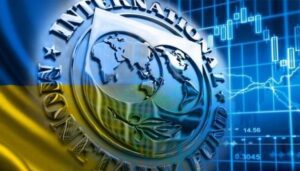
Ukraine has received $1.3 billion in additional emergency financing from the International Monetary Fund (IMF), Prime Minister Denys Shmyhal has said.
“$1.3 billion of additional emergency financing from the International Monetary Fund has arrived in Ukraine. The funds will be used to finance priority needs: strengthening defense capabilities, paying pensions, social programs and supporting the economy,” Shmyhal wrote on his Telegram channel on Thursday.
According to him, in general, since the beginning of the full-scale war, the IMF has provided Ukraine with $2.7 billion.
“Also, in the near future, we will start preparing a new special program with the Fund, which will start working next year. We thank our partners and allies for their unwavering support,” the prime minister said.

Turkish President Recep Tayyip Erdoğan has called for continuing the implementation of the Istanbul agreement on the shipment of grain and fertilizers from Black Sea ports.
“There is yet another question regarding grains and fertilizers. [It is necessary] to strengthen the Istanbul agreement and to continue its fulfillment so that Russian fertilizers reach the poorest countries via Turkey,” Erdoğan said at a meeting with Russian President Vladimir Putin.
The UN, Russia, Turkey and Ukraine signed a document in Istanbul on July 22 to open a grain corridor from three Ukrainian ports – Chornomorsk, Odesa and Pivdenny.

The demand for townhouses and cottages in Kyiv in September decreased by 60-100% since the beginning of the year, while prices in hryvnia equivalent increased by 75%, said Viktor Kovalenko, the director of the RealExpo consulting company.
According to a company study published by the zagorodna.com Internet portal, the cost per square meter in suburban real estate was affected by the growth of the dollar exchange rate and an increase in the cost of construction materials by 50%.
Most of all, the average price in January-September increased in the Solomiansky district – by 89.8% (up to UAH 50,400/sq m). In Holosiyivsky district, the price per square meter increased by an average of 75% (up to UAH 76,300/sq m), in Podilsky – by 67% (up to UAH 91,000/sq m).
According to the company, in the nine months of 2022, two new projects appeared on the suburban real estate market in Kyiv, while over the same period last year, the supply increased by 16 new projects.
At the same time, construction has been frozen in Kyiv at nine sites, which is about a third of the total number of cottage settlements under construction and projected, the study notes.
According to the developers of suburban real estate surveyed by the company, the demand for this type of housing has declined significantly, but developers report the presence of pent-up demand.
“Demand for cottages in Kyiv, according to the experts, has decreased by 60-100% since the beginning of the war, but it is gradually resuming. It was military operations in Kyiv and its environs, attacks that influenced and continue to influence the decline in demand for townhouses and cottages in Kyiv,” explained Kovalenko.

Quotes of futures for US stock indices began to decline sharply on Thursday after data from the US Department of Labor indicated only a slight slowdown in inflation in the United States.
Consumer prices (CPI index) in the US in the past month rose by 8.2% in annual terms, according to data from the country’s Department of Labor.
Thus, inflation in September slowed to a seven-month low compared to 8.3% in August, but was higher than the 8.1% expected by analysts polled by Bloomberg.
Meanwhile, the number of Americans who applied for unemployment benefits for the first time increased by 9 thousand last week and amounted to 228 thousand people, updating the maximum in a month and a half. Analysts on average had expected the figure to rise to 225K, according to Trading Economics.
In addition, investors are evaluating the quarterly reports of large companies, which mostly turned out to be better than Wall Street’s expectations.
Shares of Walgreens Boots Alliance are up 1.1%. The pharmacy chain recorded a decrease in revenue in the fourth financial quarter, but the figure exceeded analysts’ expectations.
Delta Air Lines is up 1.8%. One of the largest airlines in the United States in the third quarter received revenue that was better than the same period before the pandemic in 2019 and the market forecast.
Domino’s Pizza Inc stock quotes jumped 6.5%. The American chain of pizza restaurants in the third quarter of fiscal 2022 decreased net profit, but the revenue figure exceeded consensus forecasts.
The market value of BlackRock falls by 2.7%. The world’s largest company in terms of assets under management reduced its net profit in the third quarter by 16.4%, although the adjusted figure and revenue were better than experts’ expectations.
Capitalization of Applied Materials Inc. declined 4.3% after one of the world’s largest chip manufacturing equipment manufacturers downgraded its fiscal fourth quarter revenue guidance due to US trade restrictions blocking shipments of high-tech semiconductor components and manufacturing equipment to China.
The value of the December futures E-mini on the Dow Jones index by 15:35 CSK fell by 1.36% and amounted to 28864 points. The quotation of the December E-mini futures on the S&P 500 fell by this time by 1.82%, to 3523.25 points. Futures on the Nasdaq 100 for December fell 2.81% to 10,535.75 points.
Prior to the release of inflation data, all three futures were up more than 1%.

Oil prices began to rise moderately during trading on Thursday, recovering from the decline over the previous three sessions.
December futures for Brent on London’s ICE Futures exchange increased by $0.38 (0.41%) to $92.83 per barrel by 15:06 CST.
Quotes of futures for WTI for November in electronic trading on the New York Mercantile Exchange (NYMEX) by the specified time increased by $0.28 (0.32%) – up to $87.55 per barrel.
On Wednesday, Brent shed 2%, WTI – 2.3%, both brands finished in the red for the third session in a row.
Traders’ attention on Thursday is focused on the US Department of Energy’s report on energy stocks in the country over the past week, which will be published at 18:00 Moscow time on Thursday.
Experts polled by S&P Global Commodity Insights predict a weekly increase in US oil inventories by 2.2 million barrels, as well as a decrease in gasoline and distillate reserves by 2.1 million and 2.3 million barrels, respectively.
Data from the American Petroleum Institute (API), released yesterday, showed an increase in US oil inventories for the week ended October 7 by 7.1 million barrels after a decrease of 1.77 million barrels a week earlier.
Meanwhile, the International Energy Agency (IEA) on Wednesday lowered its 2022 oil demand growth forecast by 100,000 b/d to 99.6 million b/d. Thus, in 2022, the IEA expects global oil demand to grow by 1.9 million b/d against 2 million b/d a month earlier. The estimate of global oil demand in 2023 has been reduced from 101.8 million b/d to 101.3 million b/d.
The agency notes that the estimate of global demand has been adjusted due to the deterioration of the global economy, as well as rising fuel prices due to the adopted OPEC + plan to reduce production.
“Sustainable growth prospects are rapidly fading away amid persistent inflationary pressures, quantitative tightening, regular increases in borrowing costs, a strong dollar and coronavirus-related restrictions in China, the world’s second-largest economy,” said PVM analyst Tamas Varga.

As part of the Steel Front military initiative founded by Rinat Akhmetov, more than 2,000 drones and walkie-talkies, 700 cars and half a million liters of fuel were handed over to Ukrainian soldiers, the businessman’s press service told Interfax-Ukraine.
He also handed over to the Armed Forces of Ukraine more than 150,000 bulletproof vests produced at SCM enterprises. “For this, metallurgists have mastered the technology of smelting special armored steel of a high level of protection, and also found contractors who sew plate carriers,” the press service reports.
In addition to bulletproof vests, the soldiers also received other means of protection: more than 20,000 helmets and 40,000 first-aid kits produced in accordance with NATO standards. “Because this war is primarily a war of high technology, Akhmetov has directed millions to purchase cars, drones and walkie-talkies – this is what gives our soldiers an advantage at the front,” the text says.
More than 1,011 modern drones and 1,292 walkie-talkies, 1,600 special devices (thermal imagers, rangefinders) have already been handed over to the military. To ensure the mobility of the units, the SCM businesses handed over more than 700 vehicles to the front, primarily reliable off-road vehicles, and provided them with fuel. In total, 595,000 liters of fuel were sent to the needs of the Armed Forces of Ukraine and peaceful cities.
“We do not plan to stop and will do everything to bring Ukraine’s victory closer. And we will definitely win,” Akhmetov said.
As reported, since the beginning of the war, SCM companies have sent over UAH 3 billion to help Ukraine and Ukrainians, and this figure is growing every day.